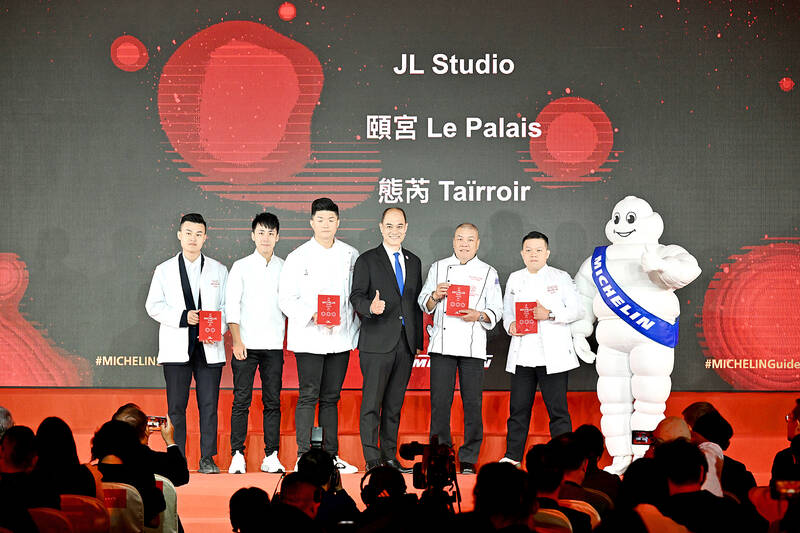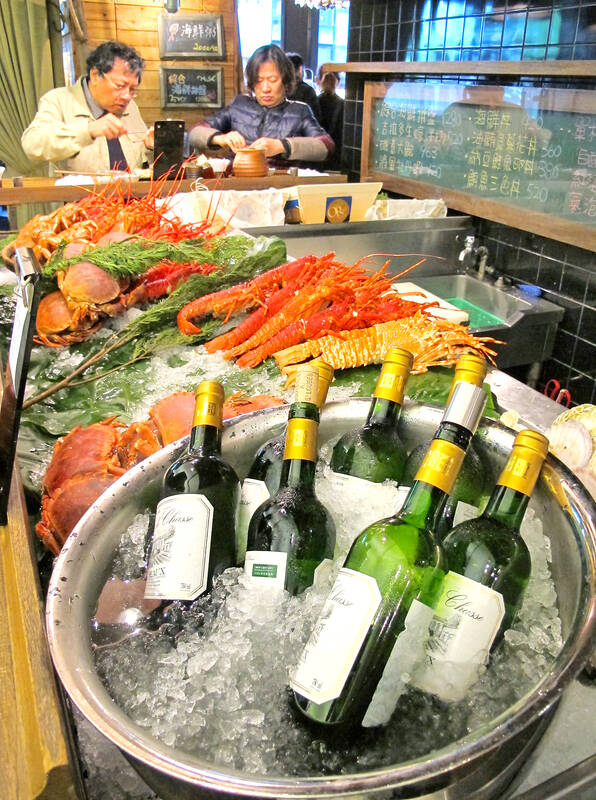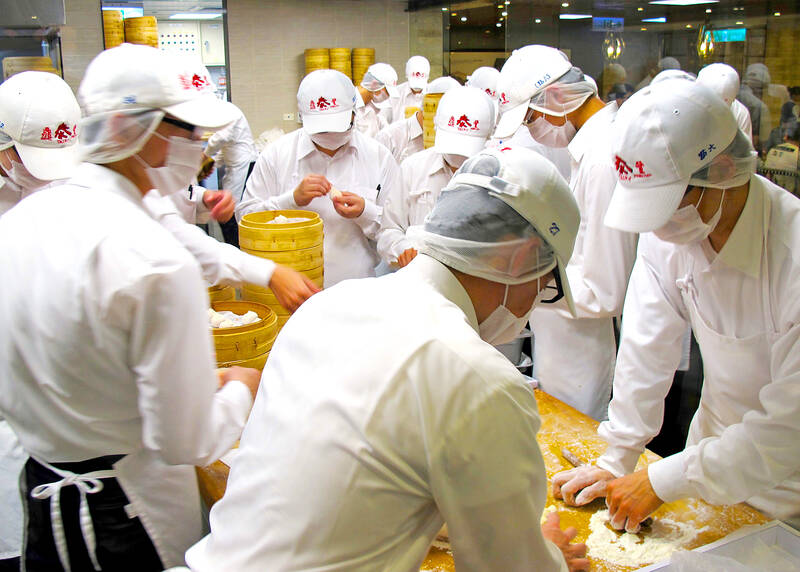Whenever international comparisons make Taiwan look good, local media are usually quick to share the news. So it’s surprising that one recent analysis, which listed Taipei as the world’s fifth best city for foodies, seems to have gone ignored.
The Food Lovers’ Index, created for UK tour company Titan Travel and published on Dec. 8, rated Paris, Barcelona, Miami and Amsterdam as numbers one through four. Ranking just below Taipei, and filling out the Top Ten, were Denpasar (on the Indonesian island of Bali), Kuala Lumpur, New York, London and Las Vegas.
Another recent report, summarized by a handful of local Chinese-language Web sites, concluded that Taiwan’s capital is the ninth best place on the planet in terms of restaurants.

Photo: Peter Lo, Taipei Times
Resonance Consultancy’s 2024 World’s Best Cities overall ranking — which weighs prosperity, population diversity and prominence in international media, among other metrics — placed Taipei 42nd out of 270-plus featured cities across the world, just below Copenhagen and one position above Austin, Texas.
Resonance, which specializes in branding and promoting destinations, praised Taipei as “The birthplace of beloved boba (aka, bubble milk tea), Mongolian BBQ and Din Tai Fung’s Michelin-starred soup dumplings,” noting that its “dynamic culinary scene” includes markets, rechao (熱炒, fast stir-fried dish) establishments, and “gourmet restaurants like RAW and Mume.”
The invention of boba milk tea is usually traced back to Taichung, not Taipei.

Photo: Steven Crook
Titan Travel’s Food Lovers’ Index awarded each city a score out of 10 according to how many child-friendly restaurants, vegetarian eateries, vegan-option restaurants, fine-dining establishments and Michelin-starred restaurants it had per square kilometer.
Asked why per square kilometer, rather than per 100,000 or million inhabitants, was used as the basis of calculations, Grace Burton of Digitaloft, the UK firm which compiled the index for Titan Travel, told the Taipei Times by email that this approach was chosen because “it made more sense” when looking at cities which have a lot of visitors in addition to a substantial permanent population.
“The number of child-friendly, vegetarian, vegan-option and fine-dining restaurants was taken using the Tripadvisor Web site, using filters to collect results. The number of different cuisines was also taken from Tripadvisor, to find the cities with the most diverse cuisines,” she explained.

Photo: Steven Crook
There’s an obvious flaw in this methodology: There are dozens of eateries in Taipei which fall into one of these categories, but which haven’t been reviewed on Tripadvisor.
For example, Happy Farm Vegetarian Restaurant (開心農場素食店), which on Google Maps scores an average 4.6 out of 5 from 461 reviews, doesn’t appear on Tripadvisor’s list of meat-free eating places in Taipei. Nor does Hemiao Vegetarian Food (禾苗素食), which has a 4.4 rating from 285 Google Maps reviews.
According to Burton, Digiloft began by looking at a list of the world’s top 30 most visited cities, from which Medina and Mecca were removed, due to the lack of non-religious tourism. Less-visited towns and cities were ignored, even though some Taiwanese would say that Tainan’s food is more delicious than Taipei’s, just as there are French people who prefer the food scene in Lyon to that in Paris.

Photo: Steven Crook
DO FOODIES CARE ABOUT RANKINGS?
For Stanford Chiou, an American food enthusiast of Taiwanese descent, one of the great strengths of Taipei’s culinary landscape is its accessibility.
“While restaurants like Tairroir, Raw and MUME have put Taipei on the fine dining map, where Taipei shines is the availability of high-quality, affordable options, the most visible of which are the night markets,” says the New York resident.
“This accessibility isn’t only economic. Because dining with children is the rule rather than the exception, child-friendly options are plentiful. The vegetarianism of devout Buddhists and Taoists is well-catered to, and there are a growing number of restaurants that adhere to Western vegan strictures,” says Chiou, who most recently visited Taiwan in late November.
Food halls in New York, Berlin and Lisbon are trying to replicate the success of street vendors and night markets in Taiwan and other Asian countries, he’s noticed, “but higher rent and wages make this difficult to do at a comparable price point.”
In terms of pricing, Taipei’s night markets are competing with convenience stores and fast food outlets, whereas food-hall dishes in Western countries are no cheaper than fast casual chains like Chipotle Mexican Grill or Shake Shack, Chiou says.
He identifies another facet of Taipei’s eating scene which may disappoint international foodies: A relative lack of diversity.
“It’s not that Taipei doesn’t have African, South Asian or Latin American food. It’s that the options are fewer in comparison to New York or London,” he says.
Katy Hui-wen Hung (洪惠文) — co-author with this reporter of A Culinary History of Taipei: Beyond Pork and Ponlai and an occasional contributor to the Taipei Times — thinks there’s little point to lists like the one published by Titan Travel.
Since COVID-19 travel restrictions were lifted, Hung has been to several countries. She says that, based on her recent experiences, Kyoto and Lisbon are ahead of Taipei as food destinations, while London and Tokyo are “no less interesting” than Taiwan’s capital.
“Street food in Lisbon and Kyoto isn’t about being cheap and funky, whereas Taiwan’s is often marketed as being inexpensive and a fun night out,” she adds.
For Hung, the various food-safety scandals that erupted in the 2010s still cast a pall over Taiwan’s culinary scene.
“I’d say that Portugal has one of the best food scenes in Europe, especially the seafood, and there I never worried that the fish I ate came from a polluted pond,” she says. “Portuguese food preparation is simple and traditional, with good quality olive oil, showing the quality of the food. The way they prepare octopus is great — simple, soft, and fresh. But in Taiwan there’s always this safety concern, and I know that some people avoid seafood in Taiwan because of them.”
Steven Crook has been writing about travel, culture and business in Taiwan since 1996. He is the author of Taiwan: The Bradt Travel Guide and co-author of A Culinary History of Taipei: Beyond Pork and Ponlai.

In the March 9 edition of the Taipei Times a piece by Ninon Godefroy ran with the headine “The quiet, gentle rhythm of Taiwan.” It started with the line “Taiwan is a small, humble place. There is no Eiffel Tower, no pyramids — no singular attraction that draws the world’s attention.” I laughed out loud at that. This was out of no disrespect for the author or the piece, which made some interesting analogies and good points about how both Din Tai Fung’s and Taiwan Semiconductor Manufacturing Co’s (TSMC, 台積電) meticulous attention to detail and quality are not quite up to

April 21 to April 27 Hsieh Er’s (謝娥) political fortunes were rising fast after she got out of jail and joined the Chinese Nationalist Party (KMT) in December 1945. Not only did she hold key positions in various committees, she was elected the only woman on the Taipei City Council and headed to Nanjing in 1946 as the sole Taiwanese female representative to the National Constituent Assembly. With the support of first lady Soong May-ling (宋美齡), she started the Taipei Women’s Association and Taiwan Provincial Women’s Association, where she

Chinese Nationalist Party (KMT) Chairman Eric Chu (朱立倫) hatched a bold plan to charge forward and seize the initiative when he held a protest in front of the Taipei City Prosecutors’ Office. Though risky, because illegal, its success would help tackle at least six problems facing both himself and the KMT. What he did not see coming was Taipei Mayor Chiang Wan-an (將萬安) tripping him up out of the gate. In spite of Chu being the most consequential and successful KMT chairman since the early 2010s — arguably saving the party from financial ruin and restoring its electoral viability —

It is one of the more remarkable facts of Taiwan history that it was never occupied or claimed by any of the numerous kingdoms of southern China — Han or otherwise — that lay just across the water from it. None of their brilliant ministers ever discovered that Taiwan was a “core interest” of the state whose annexation was “inevitable.” As Paul Kua notes in an excellent monograph laying out how the Portuguese gave Taiwan the name “Formosa,” the first Europeans to express an interest in occupying Taiwan were the Spanish. Tonio Andrade in his seminal work, How Taiwan Became Chinese,